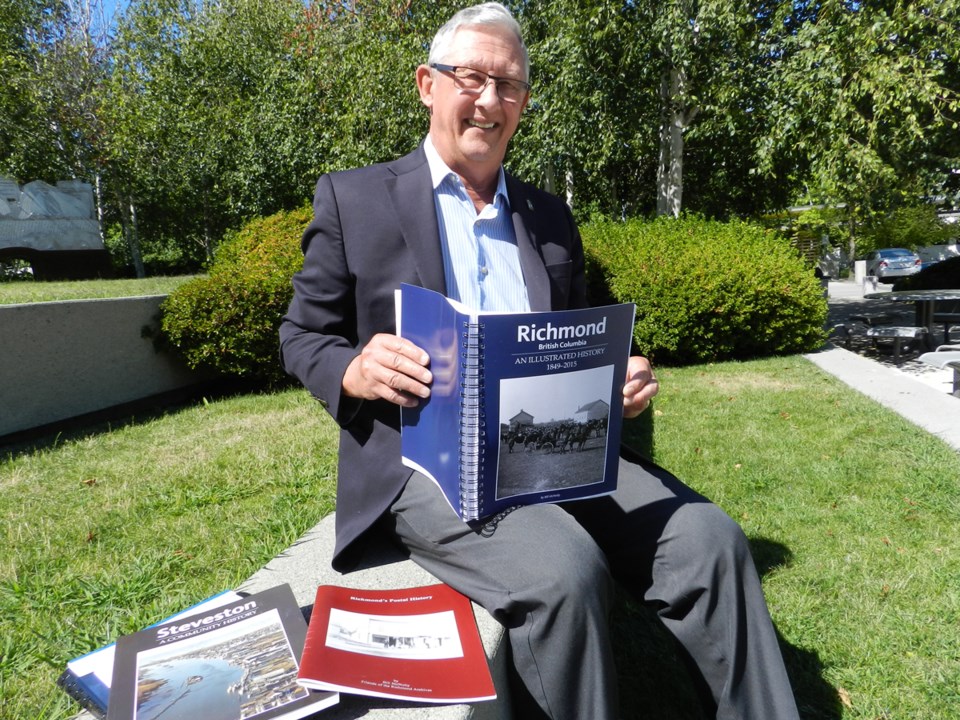When Coun. Bill McNulty sees a street sign in Richmond, he will often stop and briefly reminisce if it’s named after a pioneering family.
He recalls the history, the effort and dedication of the people — the fishers, farmers, politicians and everyday folk who helped build the foundation of the city.
It’s something he hopes to instill in others with his recently completed book called Richmond, British Columbia, An Illustrated History 1849 – 2015.
“It hits some highlights of each year as Richmond evolved,” he said, “because most people in Richmond have no clue of where we’ve come from. They don’t realize, for example, we were once 100 per cent dedicated to agriculture and fishing.
“And they don’t recognize the pioneers when they see roads with the names like Cooney Road or Blair Drive.”
This is not the first time McNulty has produced a book. A keen track athlete in his day, he’s penned three on national athletics, a 75th anniversary of Vancouver’s Magee secondary, where he worked as a school counsellor for many years, and two books on Richmond history.
His third, and latest work, contains close to 400 pages and about as many photos, some rarely seen outside the local archives.
“The book is much bigger than I anticipated. I just kept finding more and more information. It runs until 2015 because I had to stop somewhere. I could still be writing,” he quipped.
McNulty, who has lived here since 1971, said he wanted to include the names of as many people as possible who were involved in local organizations and groups to not only grant them the recognition of the role they played, but to lay out for readers the threads in the community that attached people to groups and their accomplishments, especially in the early years.
“It wasn’t an easy life,” he said, adding he was continually amazed at how much those early settlers were able to accomplish. “That pioneer spirit is there, so is what they did and left behind for us. That’s what made me appreciate more about our history.”
One group he focused on was the Japanese-Canadian community in Steveston.
“At one time, they were the backbone of Steveston. They were the ones who ran the confectionary store, grocery store, and pool hall,” he said, adding the wealth of information he came across in writing the book has him looking at producing one more time, just on the Steveston Japanese-Canadian community.
One of the landmark accomplishments chronicled in the current book centres on the development of a hospital in Steveston which stemmed from the outbreak of typhoid in 1896.
Of the 37 cases, 25 came from the Japanese-Canadian community.
That prompted the establishment of a local hospital at No. 1 Road and Chatham Street thanks to $1,800 raised by the Japanese Fishermen’s Benevolent Society to fund construction of the 30-bed facility which had a surgery ward, kitchen and staff dormitories.
McNulty said Japanese families had to pay an $8 annual fee to access the facility and pay for operating costs.
“That was the first medicare in Canada,” he said. “Tommy Douglas did not discover medicare.”
Today, that building sits adjacent to the Steveston Museum and Post Office after the city moved and renovated it to become a heritage site that houses exhibits telling the story of the Japanese Canadian community in Steveston.
Moving forward to contemporary times, McNulty looks at the boom time for Richmond in the 1960s and 70s.
“The biggest growth here happened at that time, not today,” he said. “Henry Anderson was our mayor from the ‘60s to 1973, when there was huge growth. We almost doubled our population.
“Richmond, from day one, was an investor’s dream,” he said. “And that hasn’t changed today.”
Cost of the book is $25 and once he’s recouped some of the costs, McNulty said proceeds will be sent to the Friends of the Richmond Library organization. To kick off sales, he is having a book signing on Sept. 10 at the Gulf of Georgia Cannery, where the book will be carried.



